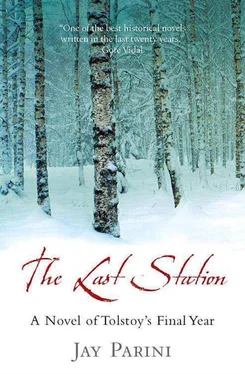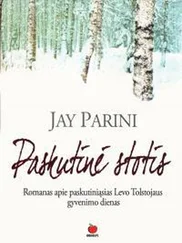‘How is Leo Nikolayevich feeling?’ she asked, breaking the silence. ‘Everyone here is worried.’
‘He has a bad cough.’
‘He should be careful. A man of his age can go quickly. My grandfather was perfectly well one day and dead the next.’
‘He says he will last only a few months, perhaps a year. And he means it.’
‘I wonder if he’s serious. If he were serious, he would take precautions.’
‘All I know is that yesterday I asked him whether or not I should take my name off the university registry, which would force me to face the question of military call-up directly. And he said that since he had only a short time to live, he was not the right person to ask.’
‘You should resign from the university, Valya. It’s dishonest to pretend to be a student when you’re not really attending classes. It’s your duty to resist evil, isn’t it?’
Her bluntness annoyed me. ‘Maybe I don’t feel like wasting away in jail? Maybe there is more important work that I should be doing?’
‘Perhaps you’re a coward.’
I was taking this more seriously than she was. She ate as we talked.
‘More soup?’ She looked up finally.
‘Yes, please.’ I almost said no, just to spite her. But I was starving. One does not eat well at Yasnaya Polyana.
‘By their deeds ye shall know them,’ she said.
In this, and only this, Masha reminds me of my mother, who quotes Scripture in the most unlikely circumstances, always drawing on the same half dozen verses she knows by heart. In recent years, I have taken to confounding her by quoting unfamiliar Scriptures back at her to prove exactly the opposite of what she has quoted to me. It drives her crazy.
‘Whatsoever the heart commandeth, this must ye do,’ I said.
Masha looked at me, puzzled. ‘ Micah? ’
‘Bulgakov,’ I said.
She did not like it when I did the teasing. She poured herself another bowl of soup and paid no attention to me. ‘You have a high opinion of yourself.’
I nodded.
‘Let’s just hope that God shares your opinion.’
I poured tea from the samovar, two steaming glasses, with lots of sugar. She accepted hers, putting the hot rim to her lips, pausing to blow, then sipping.
Footsteps and voices sounded in the hallway.
‘Sergeyenko,’ I said.
‘Let’s go to my room,’ Masha offered. ‘We can talk there. I don’t feel like conducting a seminar.’
Her frankness always startles me. I feel, by comparison, sly and hollow, a master of deceit. With a tingling in my groin, I followed her down the corridor.
A rickety chair with a lattice seat stood by the dressing table, but it had newspapers piled high on it; I had no choice but to sit beside her on the muslin bedspread. The brownish photograph of an older woman, presumably her mother, was propped on the table.
‘Tolstoy got a letter yesterday from a student in Kiev,’ I said, matter-of-factly. Masha craves little bits of information and gossip, and I feel my ability to satisfy this craving as a source of power over her. Otherwise, with her beauty and supreme self-confidence, she would control everything.
Masha looked at me intently.
‘Don’t get angry,’ I said.
‘I’m not angry. You’re playing a game with me. I don’t like that.’
‘This is no game.’
‘I won’t quarrel with you.’
I laughed a bit too ruefully. ‘You say that, but you quarrel nonetheless. We’re quarreling now, aren’t we?’
‘Valentin, my dear.’ She sighed. ‘Tell me about the letter.’
‘It was an odd letter, really… presumptuous.’
‘In what way?’
‘He said that Leo Nikolayevich ought to perform one final symbolic act. He should distribute his property among his relations and the poor, then leave home without a kopeck, making his way from town to town as a beggar.’
Masha was awed. Her face tilted upward in my direction, her thin nose razoring the light, which fell into the room through a small north window. Like a magician, ready to dazzle her, I produced a copy of Leo Nikolayevich’s response:
Your letter moved me deeply. What you suggest is what I have always dreamed of doing but have not been able to bring myself to do. Many reasons for this could be found, but none of them has to do with sparing myself. Nor must I worry how my deeds will influence others. That is not within our powers anyway, and it should not guide our behavior. One must take such action only when it is necessary, not for some hypothetical or external reason, but only to answer the demands of the soul, and when it becomes as impossible to remain in one’s old conditions as it is not to cough when you can’t breathe. I am close to that situation now. And I get closer every day.
What you advise me to do – to renounce my position in society and to redistribute my property to those who have the right to expect it after my death – I did twenty-five years ago. But the fact that I continue to live in my family, with my wife and daughter, in dreadful, shamefully luxurious conditions in contrast to surrounding poverty, increasingly torments me. Not a day passes that I do not consider your advice.
I want to thank you for your letter. This letter of mine will be shown to only one other person. I will ask you to show it to no one.
I had forgotten that last line.
‘You should not have shown it to me,’ Masha said.
I wished she had been less explicit.
‘But what sincerity he has!’ she continued.
‘Remarkable.’
It pleased me that she passed quickly over the fact of my having shown her the letter.
‘He speaks the truth,’ I said, ‘even when it’s painful to him.’
She agreed. I tucked the letter back into my pocket, still regretting my lack of foresight. I had just been showing off. It seems I have no moral standards.
‘He admires you,’ said Masha.
‘Me?’
‘Sergeyenko told me so. He’s miserable about it. It’s unfair, he says, that someone like you, who has only just arrived, should enjoy such close relations with Leo Nikolayevich when so many Tolstoyans, such as himself, hardly ever see him.’
‘Leo Nikolayevich treats me well. But he’s kind to everyone, even Tanya’s silly husband, Sukhotin.’
‘Perhaps, but he lets you answer his personal letters. And he trusts you with the anthology.’
‘I’m his secretary. I’m sure Gusev had the same privileges. Otherwise, I would be quite useless to him.’
‘But he also takes you with him in the afternoon. Gusev did not go with him to Zasyeka Wood.’
It is true enough. Leo Nikolayevich takes few people with him on rides or walks in the woods, yet he often asks me to accompany him. Occasionally he will take Sasha or Dr Makovitsky. But almost nobody else.
‘What do you talk about when you’re with him?’
I told her the truth. ‘We talk about me.’
‘Really?’
‘It’s stupid, isn’t it? We should be talking about him, or about his ideas. But he seems so curious about me. He wants to know everything about my parents, about my relations with women, my experience of God – everything.’
‘What relations with women?’
She tried not to smile, but her eyes shone like quartz crystals. She stirred in me a strange feeling of warmth – like the coals bedded down in a fire pit after a long night’s burning.
Without calculation, I moved my hand to her hair and stroked it. It was blond, hay colored, fresh, and perfectly straight. Her eyes, with an emerald tint that recalled the sea, fixed me in their beams. The green irises circled each dark pupil like summer fields around a pond. One could dive into those dark waters easily, and never return.
‘I suppose you don’t want to talk about the women you have loved,’ she said. The irony had gone, burned off like morning fog.
Читать дальше












